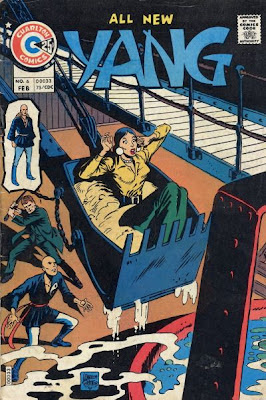"Good God above!" people say to me. "How did you creep up on me from behind like that when I have the hearing of a highly trained chihuahua?"
"It's easy," I tell them. "I was taught a mastery of the martial arts by a man who used to berate me if I tore his rice paper carpets."
"Well, don't have rice paper carpets," I used to tell him. "And for that matter, the wallpaper made of bread's not that great an idea either. It'll be a magnet for insects. If you don't watch it, you'll be eaten out of house and home by them."
And you know what?
He was.
The council had to rehouse him.
He now lives in sheltered accommodation and the only visitor he ever gets is a local authority funded Bontempi organist who comes round once a week and plays Stranglers songs at him.
It's a heart-warming anecdote from my past, and if there's anyone who could relate to such a background, I'm sure it'd be Yang.
Yang bears no resemblance to any other character you've ever seen. He's a Chinese martial artist who travels the American Wild West sorting out whatever black hat wearing cowboy bad guys he encounters. In Yang #6, he's on the warpath after a man called Bellows buys a stolen sacred Buddha.
Yang promptly makes his way across a large chunk of America, beating up anyone who gets in the way of his quest to retrieve it.
To call the tale action-packed would be an understatement. Yang's like the Duracell Bunny of karate.
He never stops to display anything that resembles a personality or an interest in anything but his mission and, on the strength of this tale, he comes across as though he might be a little insane, such is his dogged devotion to going through whatever hardship is necessary to retrieve a statuette. Yang might have echoes of Shang-Chi and Kwai Chang Caine about him but he seems to lack any of their sense of perspective, thoughtfulness or willingness to internally debate the rights and wrongs of a course of action.
Fortunately, Bellows isn't only a man who buys stolen Buddhas. He's also a man who uses slave labour in his mine, so Yang gets even more reason to get violent with him and his men. Our hero also shows a happy willingness to start shooting people, making you wonder why he bothers with the martial arts at all.
It's easy of course to compare Yang with Shang-Chi and Kwai Chang Caine but it'd be true to say that, with his cheery acceptance of violence and his briskly practical one-dimensionality, his resemblance to them's no more than superficial.
Joe Gill's script runs on a sort of tram-line, never allowing the story to divert from its main course and is a little confusing in places. The art by Warren Sattler has a certain simplicity to it that means it's never off-putting - but neither is it dynamic, stylish nor distinctive enough to even begin to fully explore the visual potential of its subject matter. On the plus side, it is at least clear and unfussy, with occasional echoes of Steve Ditko.
Despite the fact it's a Charlton comic, and I will always have a place in my heart for anything Charlton produced; let's be honest, if you have an issue of Shang-Chi in front of you and an issue of Yang - on the strength of this yarn - it's pretty obvious which one you're going to go for.



One of my favorite aspects of your blog is learning about a comic that I've never even heard of before.
ReplyDeleteYes, the magazine rack would have to be pretty thin before I picked up Yang; but if I found on my pillow before bedtime, of course I'd read the whole thing!
It's weird but, looking at the Yang covers on GCD, it's obvious that me and my sister had just about every issue of Yang ever published.
ReplyDeleteAdmittedly, there were only about thirteen issues in all but it must've grabbed us, even if I can barely remember anything about any of those issues now.
"Yang" was always the last comic I would choose to pick up from the old spinner racks (well baring romance comics - which I now wish I had some of as they had some great art) it was a very bland comic (obviously as you note piggybacking on the success of the" Kung Fu" Tv series) amazingly it even spawned a spin off comic "House of Yang" which whilst still being bland was better than "Yang" McScotty
ReplyDeleteSadly, I don't think I ever had any issues of "House of Yang".
ReplyDelete